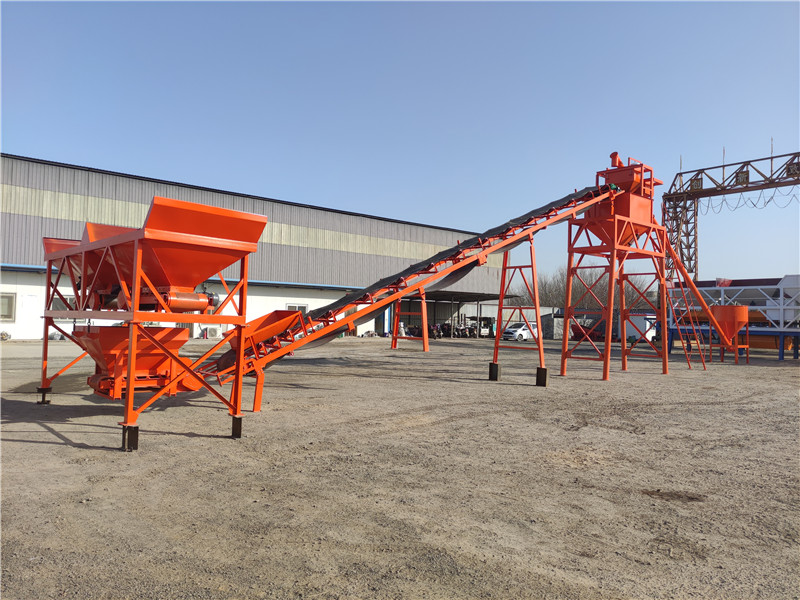Concrete Batch Plants: A Complete Guide
Introduction
Concrete is the foundation of most modern construction projects, from high-rise buildings to bridges, roads, and residential homes. But how is concrete produced at scale with consistent quality? The answer lies in concrete batch plants. Understanding their functionality and types can help project managers and contractors choose the right equipment to meet their construction goals.
What Is a Concrete Batch Plant?
A concrete batch plant is an industrial facility where raw materials like cement, aggregates, and water are measured and combined to create concrete. These plants range from small mobile units to large, high-capacity stationary plants. They are essential for projects requiring continuous and large-volume concrete supply with precise quality control.
How a Concrete Batch Plant Works
The concrete batching process involves several stages:
Material Handling: Cement is stored in silos, aggregates in hoppers, and water in tanks.
Weighing: Raw materials are measured according to the required concrete mix design.
Mixing: Materials are transferred to a central mixer for thorough blending.
Loading: Finished concrete is discharged into trucks or mixers for transport to job sites.
Modern batch plants use computerized control systems to ensure consistency and efficiency throughout the process.
Types of Batch Plants
Dry Batch Plants
In dry batch systems, dry materials are mixed first, and water is added during transport. This method allows for on-site water adjustments and is ideal when precise control over the water-cement ratio is required.
Wet Batch Plants
Wet batch plants mix all materials, including water, at the plant. This results in a uniform and ready-to-use mix. Wet batching is preferred for projects with strict quality requirements and high output needs.
Stationary Batch Plants
Designed for long-term or high-volume projects, stationary plants are fixed installations that offer high production capacity and consistency. They are best suited for large infrastructure developments such as highways and dams.
Portable Batch Plants
These mobile units are ideal for smaller or temporary construction sites. They can be easily relocated and require minimal setup, making them cost-effective for rural or remote operations.
Key Components of a Concrete Batch Plant
Aggregate Bins: Store sand and gravel separately.
Conveyors: Transport aggregates to the mixing unit.
Cement Silos: Keep cement dry and ready for use.
Weigh Hoppers: Ensure accurate proportioning of materials.
Mixers: Combine materials into a homogenous mix.
Control Systems: Automate the batching process.
Temperature Control Units: Heaters or chillers manage mix temperature, essential in varying climates.
Advantages of Using a Batch Plant
Consistency: Achieve uniform mix quality across all batches.
Efficiency: Reduce downtime and boost productivity.
Customization: Adjust mix design to meet project-specific requirements.
Cost Savings: Lower material wastage and reduce reliance on external suppliers.
Environmental Compliance: Many modern plants integrate eco-friendly systems like waste recycling and dust control.
Applications Across the Construction Industry
Concrete batch plants are used in:
Residential and Commercial Buildings: Foundations, slabs, and structural components.
Infrastructure: Roads, bridges, airports, and rail systems.
Industrial Facilities: Warehouses, manufacturing plants, and distribution centers.
How to Choose the Right Batch Plant
Assess your project size and concrete volume needs.
Consider your site location and logistics.
Select between wet or dry batching based on performance needs.
Ensure compliance with local environmental and safety regulations.
ROI: Are Batch Plants a Smart Investment?
Owning a concrete batch plant can generate long-term cost savings. For example, using a mid-range batch plant to produce 17,000 cubic yards of concrete in-house can save upwards of $800,000 compared to buying from a ready-mix supplier. With a break-even point as low as 6,000 yards, it can be a strategic investment for construction firms handling frequent concrete-intensive projects.
About Henan Shengmao Machinery Co., Ltd.
Founded in 2001, Henan Shengmao Machinery Co., Ltd. is a trusted name in the construction machinery industry. Based in Zhengzhou—the heart of China’s construction machinery manufacturing—we supply high-quality, competitively priced concrete batch plants and related equipment to over 1,000 clients globally.
With a strong network of parts suppliers and skilled workers, we ensure reliable product quality, fast turnaround, and tailored solutions to fit diverse project needs. As a long-term partner, we go beyond supplying machinery—we provide value-added services that align with our clients’ visions and operational strategies.
Get in Touch
If you're considering upgrading your concrete production capabilities, contact Henan Shengmao Machinery Co., Ltd. today to discuss your needs or request a quote. Let us help you find the batch plant solution that maximizes your project success.














